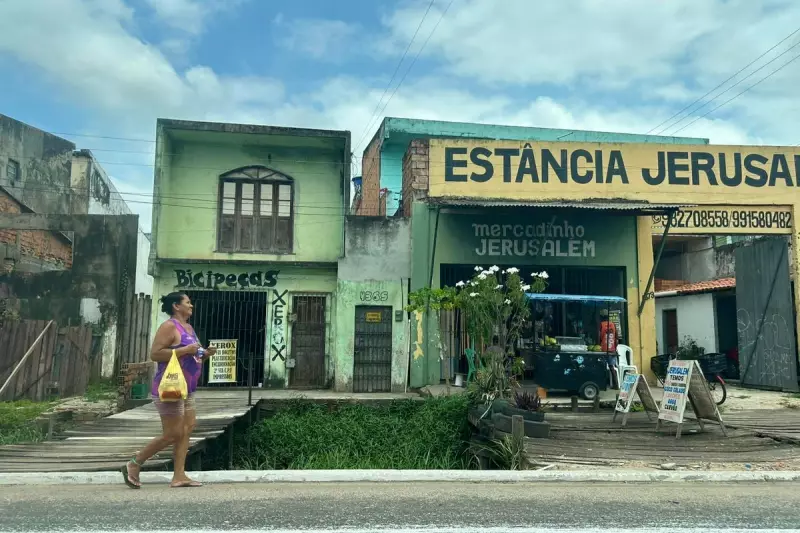
Life in the Baixadas: A World Away from the Cop30 Conference
While the world's attention turns to the UN Cop30 climate summit in the Amazonian city of Belém, the daily reality for most of its 1.4 million inhabitants is a far cry from the lush, green forests one might imagine. The 2022 census revealed a stark truth: 57 per cent of the population, some 745,000 people, live in informal settlements known as 'baixadas'. These neighbourhoods, whose name derives from the Portuguese word for 'lowered', are situated on the low-lying flood plains of the mighty Guamá River.
Official records state Belém was founded by the Portuguese in 1616, but a large indigenous Tupinambá settlement existed long before. Today, this legacy lives on through the many baixada residents of indigenous and Afro-Brazilian descent, who maintain a deep, spiritual connection to the waterways. "Where there is river, there is life, and there are people and culture," explains Guido, a resident of Jurunas, one of Brazil's largest favela areas.
Environmental Racism and the Growing Climate Threat
With 40 per cent of Belém lying below sea level, the life-giving river has become a source of increasing danger. Coastal erosion and extreme weather, exacerbated by a population that has swelled from 250,000 in 1950, pose severe threats. A June disaster risk reduction plan by the local government identified 301 areas in the city at risk of flooding.
Flooding is a constant fear. Bea, 53, described how heavy rain the day before our meeting had flooded low-lying homes. Thalya, another resident, recalled serious floods in 2023 that washed out supermarkets and malls, leaving many with nothing.
Within the city, many smaller rivers have been channelised into concrete waterways, disrupting natural flows and cutting off access for locals. These channels in the baixadas are often filled with garbage and sewage. A 2023 study by Instituto Trata Brasil found that only 20 per cent of the city's wastewater is collected, and a mere 2.4 per cent is treated.
Pollution intensifies during droughts when water levels drop. At these times, the price of staple foods like açai increases as harvests decline on the surrounding islands. Seawater also invades the estuary, killing fish. "The ocean invades the river and kills the fish," said 31-year-old Jean. "The hot weather affects our food consumption but also our sense of identity, because we feel so connected here to the forest and the river."
Unbearable Heat and Toxic Homes
While Cop30 delegates complain of the intense Amazonian heat, for baixada residents without air conditioning, extreme heat is an unbearable daily reality, worsened by a lack of shade. Many also live under roofs made of asbestos, a highly toxic material only completely outlawed by Brazil's Supreme Court in 2017. Long-term exposure to extreme heat causes these roofs to crack, increasing health risks.
Guido describes these cumulative climate impacts as 'environmental racism', as they disproportionately affect the non-white residents of the baixadas. The state of Pará, where Belém is the capital, has the country's largest proportion of mixed-race people but a GDP per capita less than half that of Rio de Janeiro or São Paulo.
Cop30 vs. Cop de Baixadas: A Clash of Priorities
Most Belém residents are happy to host Cop30, recognising the need to address the climate crisis and welcoming the 4.8bn reais (£688m) federal investment in city infrastructure. However, baixada residents feel the talks lack representation for those who suffer most.
"Cop is for the negotiators and for groups that are bigger and more organised – not for small organisations in territories in the surrounding city," says Ruth. Jean questions the conference's local impact: "If they are not worried about the demands of the city, and if they don’t want to leave a real climate legacy, then why don’t they just hold the conference online?"
In response, Jean and Ruth helped organise 'Cop de Baixadas', a local community forum inspired by the UN conference but based in their own Jurunas neighbourhood. "We defend the Cop30 conference, but in this space we switch the dynamic, with real people speaking, and governments sitting back and listening," Jean explains.
The first event in 2023 attracted 300 people, growing to 500 in 2024 and 700 at the August 2025 gathering. Alongside the official UN 'blue zone', organisers have created 'yellow zones' for public events. "Cop de Baixadas is a place where we can reflect on climate injustice and environmental racism, and share our experiences openly and freely," says Ruth.
Despite initial positive responses from local government, organisers say the new Belém city mayor elected in 2025 is "less open" to participation. Funding is also a growing concern, with Oxfam Brasil, a key backer, facing a difficult financial climate. Viviana Santiago, Oxfam Brasil's executive director, notes that Brazil's middle-income status has made it a low priority for European funders, despite its significant poverty.
Yet, for baixada residents, political disenfranchisement is nothing new. The value of their forum remains. "We have a forum now where we can talk about the real impact of climate change on people’s lives," Ruth states. "And when you do that you can mobilise and educate people, so that they can understand and respond to what is going on. This is why Cop de Baixadas is important."





